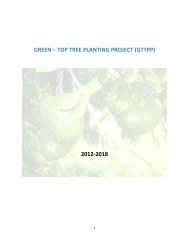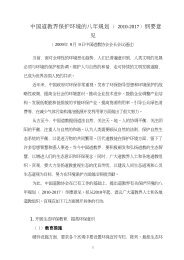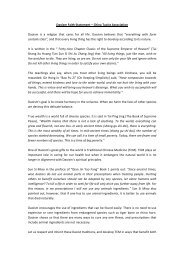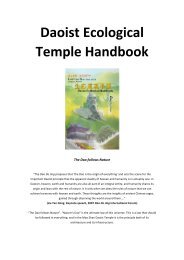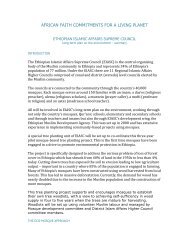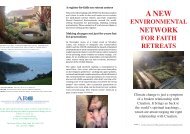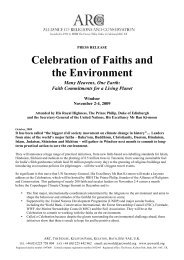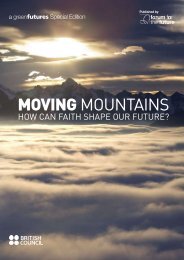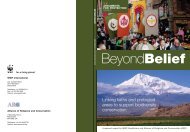summary paper - Alliance of Religions and Conservation
summary paper - Alliance of Religions and Conservation
summary paper - Alliance of Religions and Conservation
You also want an ePaper? Increase the reach of your titles
YUMPU automatically turns print PDFs into web optimized ePapers that Google loves.
SESSION 3 Conditions <strong>and</strong> criteria for partnerships<br />
Roundtable participants:<br />
Most Rev. Diarmuid Martin<br />
Archbishop <strong>of</strong> Dublin, Primate <strong>of</strong> Irel<strong>and</strong><br />
For many years I was involved directly in the area <strong>of</strong> development policy at the international level through<br />
my work at the Vatican’s Pontifical Council for Justice <strong>and</strong> Peace. I would like to begin by sharing some<br />
<strong>of</strong> my experience in various dialogues between faiths <strong>and</strong> development agencies, <strong>and</strong> especially by<br />
indicating some <strong>of</strong> the pitfalls which have made such dialogue <strong>and</strong> the subsequent partnerships less<br />
successful than one had hoped them to be.<br />
In one <strong>of</strong> the early discussions between leaders <strong>of</strong> the World Bank <strong>and</strong> the Vatican on partnership with<br />
religious bodies in development programmes, one senior World Bank <strong>of</strong>ficial was asked what the overall<br />
aim <strong>of</strong> the World Bank in such partnerships was. The answer, part in jest <strong>and</strong> partly serious, was: “We at<br />
the Bank are the world’s leading wholesaler in development theory, <strong>and</strong> you guys have a magnificent<br />
worldwide retail outlet system”.<br />
It is certainly in the interests <strong>of</strong> all that people who are working for the same goals should work as closely<br />
as possible together. But the challenge is not quite as simple as matching wholesaler <strong>and</strong> retailer in<br />
order to get it right.<br />
The first thing that any partnership must underst<strong>and</strong> is that partnership is the work <strong>of</strong> two partners, each<br />
with its own identity <strong>and</strong> specific contribution. There is a tendency for governments <strong>and</strong> international<br />
agencies – for legitimate <strong>and</strong> well intentioned reasons to want to use religious bodies. Religious<br />
partners have their own identity <strong>and</strong> are not simply useful outlets for the products <strong>of</strong> others. Their identity<br />
is intimately part <strong>of</strong> their activities. To continue using the market analogy, their outlet is an integral part <strong>of</strong><br />
their product. That is why their outlets are so effective. Changing the br<strong>and</strong> could mean smothering the<br />
entire operation.<br />
Partnerships must be marked in the first place by pr<strong>of</strong>ound respect for each partner, which means looking<br />
sensitively at the originality <strong>of</strong> each contributor <strong>and</strong> being aware <strong>of</strong> the fact there may not be perfect<br />
synergy between both partners. This means being prepared to work together where that is possible <strong>and</strong><br />
at the same time to respect differences where these exist.<br />
Religious bodies are precisely that <strong>and</strong> are not easily “harnessable” into the patterns <strong>of</strong> others. Indeed,<br />
the message <strong>of</strong> religious bodies may be opposed to the thought patterns <strong>of</strong> secular organizations.<br />
Religious bodies are there to bring a message <strong>of</strong> faith, a message about the transcendent, which will not<br />
always be manageable within utilitarian categories or in plans to get things done quickly <strong>and</strong> efficiently.<br />
Take an example <strong>of</strong> the Christian message which preaches a God whose love is gratuitous <strong>and</strong><br />
superabundant. The terms “gratuitous” <strong>and</strong> ”superabundant” are hard to fit into in a market context in<br />
which everything has its price <strong>and</strong> you get just what you pay for. Yet it is the concept <strong>of</strong> superabundant<br />
generosity which is the secret <strong>of</strong> the success <strong>of</strong> many Christian <strong>and</strong> many other religious projects in<br />
health care <strong>and</strong> education. Dialogue between international agencies <strong>and</strong> religious bodies needs rigorous<br />
evaluation. But that evaluation must also be able to look at the contribution that religious bodies bring in<br />
contexts which are not so easy to measure in traditional accounting or monetary terms.<br />
Saying that religious bodies are not easily “harnessable” does not <strong>of</strong> course mean that they should ask to<br />
be or allowed to be unaccountable. It should be the opposite, particularly in the area <strong>of</strong> the environment.<br />
The very first religious concept which springs to my mind when I think about the relations between<br />
humankind <strong>and</strong> the environment is that <strong>of</strong> creation. The term creation defines not so much the<br />
mechanics <strong>of</strong> the origins <strong>of</strong> the universe (creationism tries to do that), but much more the relationship<br />
between humanity, the creator <strong>and</strong> the rest <strong>of</strong> creation. If the world is created, then the world <strong>and</strong> all that<br />
is in it is not our own private possession. It is gift, which must be used in accordance with certain intrinsic<br />
principles which cannot be interpreted just according to our own private whim. Recognising that all<br />
creation is gift is a fundamental call to accountability about the way we use resources <strong>of</strong> any kind.<br />
47



